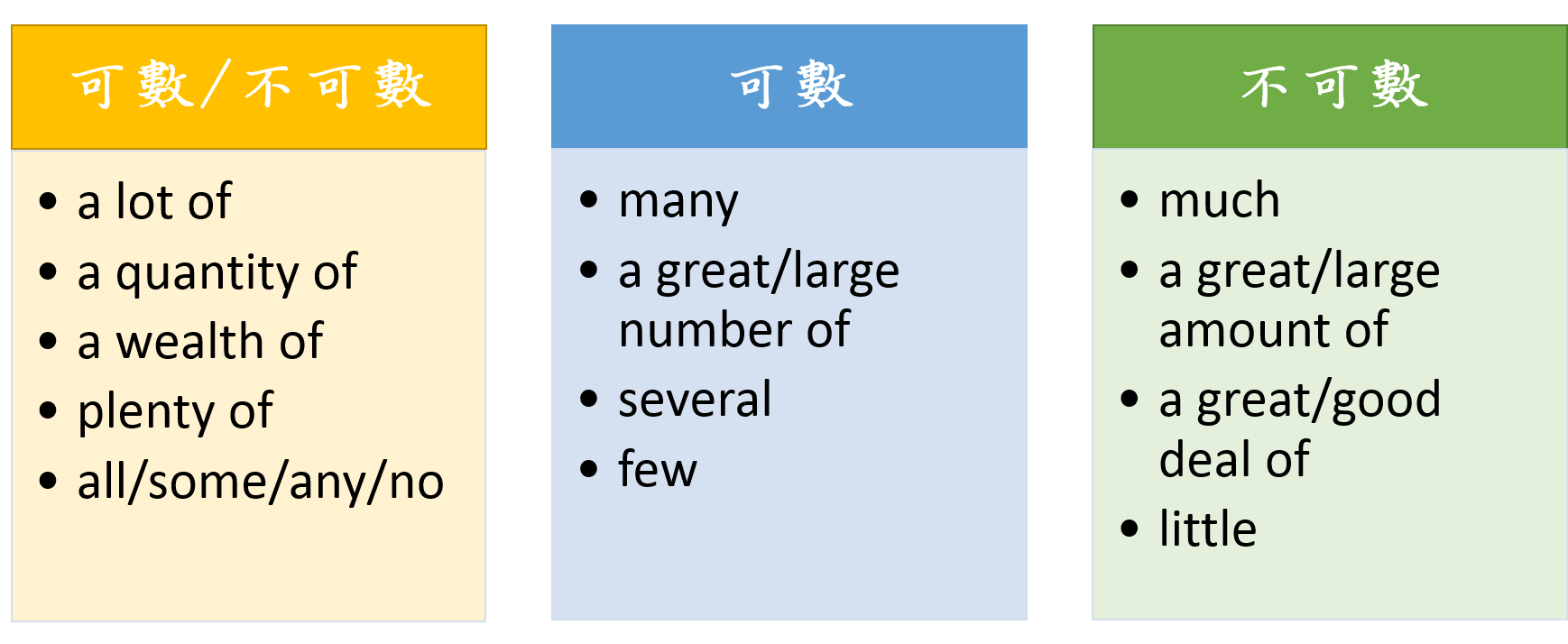- 基礎文法:
- has gone, is gone, has been
has been 表經驗
has gone 表動作, he has gone to japan
is gone 表示狀態, Is the butter all gone?
在文法上,have gone屬動詞現在完成式,be gone中的gone則屬形容詞。
另外不能用I have gone, 只能用 I have been
- this/that/these/those
that - 那一件(相對距離遠的東西) / those - 那些(相對距離遠的東西) ,單數以上
this - 這一件(相對距離近的東西) /these - 這些(相對距離近的東西) ,單數以上
- what is 人名 ?//問性別
- if 句


http://www.taiwantestcentral.com/Grammar/Title.aspx?ID=481
- to V or Ving
https://tw.blog.voicetube.com/archives/9691
- 頻率副詞位置 (Frequency Adverb)
S + 頻率副詞+一般動詞
S+ be +頻率副詞
S+ 助動詞 +頻率副詞
放句首的頻率副詞(否定)
頻率副詞+助動/be+S +V
Never will she go ...
放句首的頻率副詞(always &否定以外)
頻率副詞, S+ V...
Usually, she is ...
問句為: How often
p.s. hardly ever
p.s. I was never == I never was
- 使役動詞
have/let/make + O +V (主動) =>動作若是主動的,意為「叫受詞去…」
--> The owner had his daughter show me around.
have/let/make + O +p.p (被動
have/let/make + O + ving( 持續
get/want + O + to V (主動) =>做之動作若是主動的,意為「叫受詞去…」
have/let/make + O +p.p (被動
have/let/make + O + ving( 持續
get/want + O + to V (主動) =>做之動作若是主動的,意為「叫受詞去…」
--> We need to get him to sign the contract.
get/want + O + p.p (被動)=>若是意為「讓受詞被…」,則需用過去分詞
Johnson got the tire(受) changed //輪胎被換
get/want + O + p.p (被動)=>若是意為「讓受詞被…」,則需用過去分詞
Johnson got the tire(受) changed //輪胎被換
help+O + V (美)/ to V(英)
感官動詞 + O +V/Ving
- 情緒形容詞(ing , ed adjective)
- ** 簡單:
=> (前提 主詞為 I )?
I am bored (by this book).
I feel tired, I’m going to go to bed.
I was bored in the math lesson, I almost fell asleep.
I’m interested by your video.
2. -ing形容詞,代表某件事能影響人的情緒。所以主詞要用事物
A boring math lesson makes you feel bored.
I could watch Lucy’s video for hours because they are so interesting.(they=> video)
The food was disgusting.
-------------------------------------------------------------------------
- ***進階
- 1. -ed的主詞全都是「人」
I am bored (by this book).
I am interested. 我覺得有興趣。
She is excited . 她覺得很興奮。
I was surprised. 我覺得很驚訝。
Are you confused? 你覺得困惑嗎?
記憶方法:
She is excited . 她覺得很興奮。
I was surprised. 我覺得很驚訝。
Are you confused? 你覺得困惑嗎?
記憶方法:
中文的「人」有兩筆劃,-ed也是兩個字母,所以「人」當主詞,要表達「人」覺得有趣或無聊或其他感覺,就用-ed!
其他:
ED - how someone feel about something.
如:
I ' m bored (in the xxx).
- 2. -ing
That noise is annoying. 噪音好煩。(噪音產生煩的ing響力。)
This project is interesting. 這方案很有趣。(這方案產生有趣的ing響力。)
This project is interesting. 這方案很有趣。(這方案產生有趣的ing響力。)
因此,-ing 的主詞人、事、物都有可能,都會產生「ing響力」:
其他:
ING- the thing that cause the emotion.
I'm boring(the xxx boring me).
結論:
要說這個「人」感覺怎樣,就用「人」當主詞,搭配-ed的形容詞. 其他就用-ing!
記憶:
A boring lesson makes you feel bored.
- ***. 主被動區分:
結論: 形容詞與名詞 之間的關係 (主動or被動)
例如:
1. Annoyed apple , Annoying orange ( orange 去引響apple)
2. This is a refreshing drink. (drink 去影響人)
3. This is a refreshed room. ( room 被翻新)
- 記憶:
ING: the thing that causes the emotion.
ED: emotions how someone feels about something.
https://www.youtube.com/watch?v=TBrJbjT09qo
-------------------------------------------------------------------------
- For + Ving or To +V
*To + 不定詞是用來表示動作的目的 (purpose or intention) - 不可用 for + V-ing 來表示動作的目的.
Professor Chen has gone to Kaohsiung to attend a seminar.
*For + V-ing 是用來表示東西或物品的用途 (purpose or function)。
One is for cutting fruit and vegetables and the other is just for slicing meat.
* thank you for helping.
*For + V-ing 亦可表示某事發生的原因。
His father couldn’t talk for coughing.
-------------------------------------------------------------------------
- Most vs Most of
Most children like ice-cream.
Most of the children in my class are French. //THE to talk about a specific group
-------------------------------------------------------------------------
